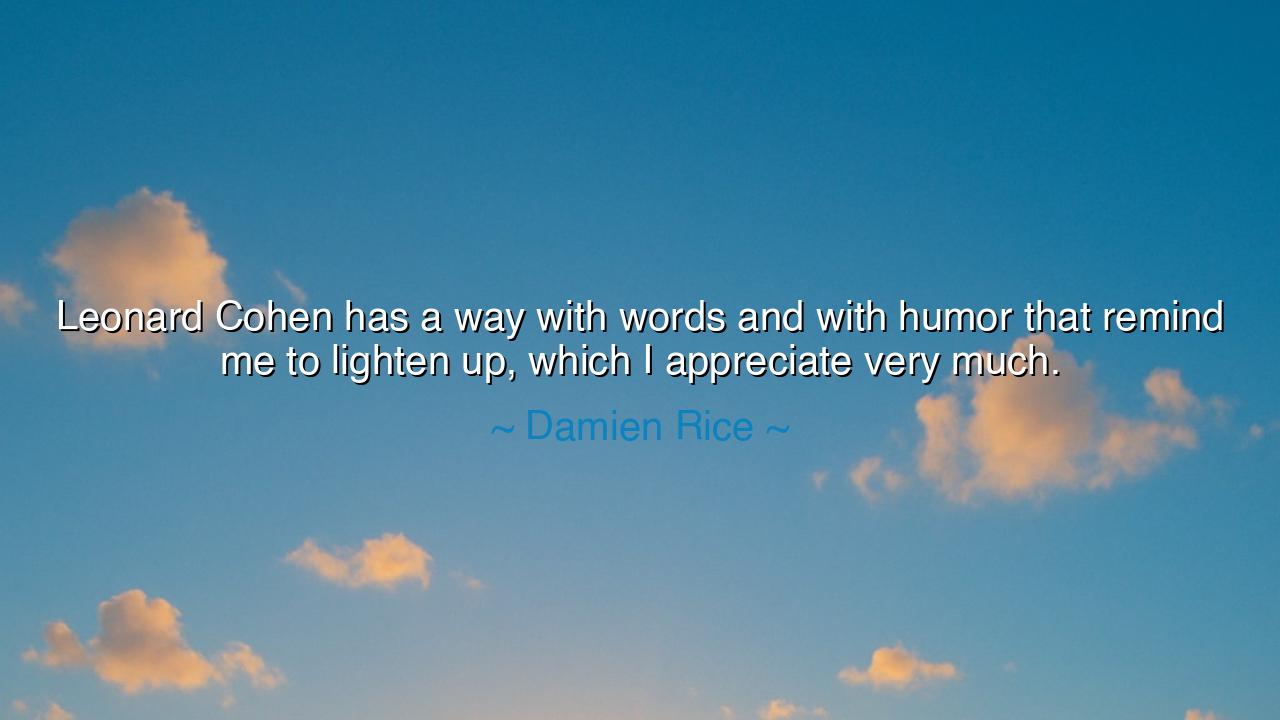
Leonard Cohen has a way with words and with humor that remind me
Leonard Cohen has a way with words and with humor that remind me to lighten up, which I appreciate very much.






When Damien Rice said, “Leonard Cohen has a way with words and with humor that remind me to lighten up, which I appreciate very much,” he was not merely expressing admiration for another artist — he was acknowledging a deeper spiritual inheritance. In these simple words lies a profound truth about balance, humility, and the redemptive power of humor. For in the art of Leonard Cohen — his poetry, his songs, his gentle wit — there exists a sacred equilibrium between the light and the dark, the sorrowful and the serene. To “lighten up,” as Rice says, is not to become careless, but to release the chains of excessive gravity that so often imprison the soul.
Leonard Cohen’s way with words was like a river — slow, deliberate, carrying both beauty and burden. He spoke often of despair, of longing, of the eternal ache between body and spirit — yet always with a smile hiding in the shadows. His humor was not the laughter of mockery, but of wisdom — the laughter of one who has suffered, yet sees beyond the suffering. Damien Rice, himself a singer of deep emotion and melancholy, found in Cohen’s humor a kind of liberation: a reminder that even the most serious heart must learn to dance. It is as if he is saying, “Do not let the weight of meaning crush your joy; do not let art, or pain, or truth become so heavy that you forget to breathe.”
This sentiment echoes the teachings of the ancients. The philosopher Lao Tzu once wrote, “He who takes things too seriously will find life unbearable.” Even in sacred traditions, the wise have known that enlightenment comes not through endless solemnity, but through balance. The Buddha is often depicted smiling, not because life is free of suffering, but because he has learned to see beyond it. Humor is the sigh of enlightenment — the sound made when the spirit releases its grip on sorrow and chooses compassion instead. Damien Rice’s words honor that same timeless lesson: that art — and life itself — must breathe, must contain both tears and laughter, or it ceases to live.
History gives us many who understood this divine paradox. Consider Abraham Lincoln, who led his nation through war and ruin, yet was famous for his stories and jokes. He carried the weight of countless deaths, yet still used humor to lift his soul and those around him. His laughter was not denial — it was defiance, a way of saying, “I will not let despair have the final word.” So too did Leonard Cohen, in his weary baritone, turn heartbreak into poetry and irony into grace. His humor was his rebellion against despair, and through it, he taught others — like Damien Rice — that the artist’s task is not to drown in meaning, but to rise through it.
There is also a deeper connection between humor and humility — the root of both words comes from the same soil. To laugh, truly laugh, is to accept one’s imperfection, to surrender the illusion of control. Cohen’s humor was the laughter of one who had glimpsed eternity and returned with a smirk. He knew that even in the midst of revelation, man remains small — and that smallness is beautiful. Damien Rice, whose music often explores pain and intimacy, recognized in Cohen’s approach a necessary antidote: that wisdom without humor becomes pride, and sensitivity without lightness becomes despair. To lighten up is not to diminish feeling, but to purify it.
In the world of art, where emotion can easily turn to torment, Cohen’s legacy is that of balance — the reminder that beauty is born not from endless intensity, but from contrast. His humor was the quiet pause between verses of sorrow, the smile that keeps the poet human. In appreciating this, Damien Rice acknowledges the path of the true artist: one who feels deeply but does not drown; one who carries truth but does not forget to live. It is a reminder for all who bear heavy hearts — that laughter, too, is sacred.
And so, let this teaching be taken as a lamp for all seekers of meaning: remember to lighten your heart, even when life grows heavy. Let your art, your work, your days be touched not only by depth, but by gentleness. Do not mock your pain, but smile at it, as Leonard Cohen did — for in that smile lies power. When you find yourself burdened by seriousness, let humor be your medicine; when your soul grows weary from striving, let lightness be your strength.
For in the end, as Damien Rice reminds us through his reverence for Cohen, the highest wisdom is not to carry life, but to dance with it. Laughter, born of truth, is the breath of the eternal — the sound of the spirit remembering that even amidst darkness, the light has never truly gone out.






AAdministratorAdministrator
Welcome, honored guests. Please leave a comment, we will respond soon